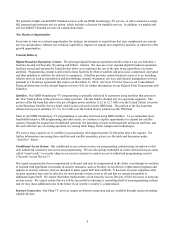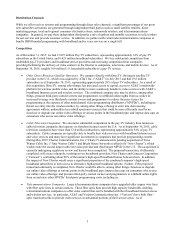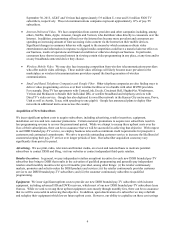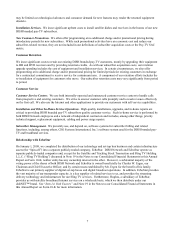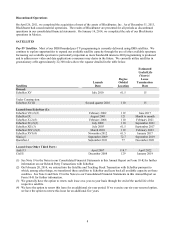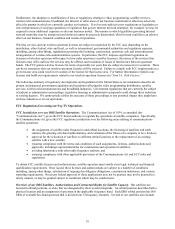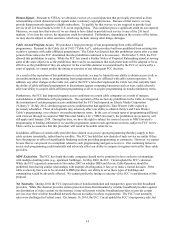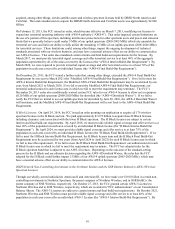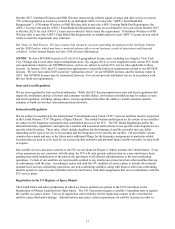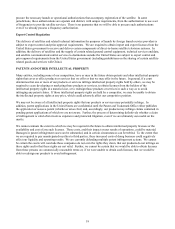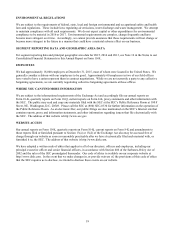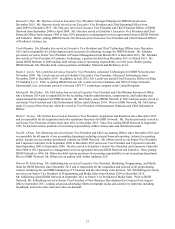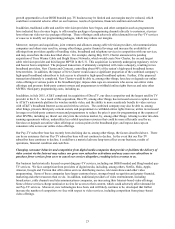Dish Network 2015 Annual Report Download - page 24
Download and view the complete annual report
Please find page 24 of the 2015 Dish Network annual report below. You can navigate through the pages in the report by either clicking on the pages listed below, or by using the keyword search tool below to find specific information within the annual report.14
Distant Signals. Pursuant to STELA, we obtained a waiver of a court injunction that previously prevented us from
retransmitting certain distant network signals under a statutory copyright license. Because of that waiver, we may
provide distant network signals to eligible subscribers. To qualify for that waiver, we are required to provide local
service in all 210 local markets in the U.S. on an ongoing basis. This condition poses a significant strain on our capacity.
Moreover, we may lose that waiver if we are found to have failed to provide local service in any of the 210 local
markets. If we lose the waiver, the injunction could be reinstated. Furthermore, depending on the severity of the failure,
we may also be subject to other sanctions, which may include, among other things, damages.
Cable Act and Program Access. We purchase a large percentage of our programming from cable-affiliated
programmers. Pursuant to the Cable Act of 1992 (“Cable Act”), cable providers had been prohibited from entering into
exclusive contracts with cable-affiliated programmers. The Cable Act directed that this prohibition expire after a certain
period of time unless the FCC determined that the prohibition continued to be necessary. On October 5, 2012, the FCC
allowed this prohibition to expire. While the FCC has issued a Further Notice of Proposed Rulemaking aimed at serving
some of the same objectives as the prohibition, there can be no assurances that such protections will be adopted or be as
effective as the prohibition if they are adopted. In the event this decision is reconsidered by the FCC or reviewed by a
court of appeals, we cannot predict the timing or outcome of any subsequent FCC decision.
As a result of the expiration of this prohibition on exclusivity, we may be limited in our ability to obtain access at all, or
on nondiscriminatory terms, to programming from programmers that are affiliated with cable system operators. In
addition, any other changes in the Cable Act, and/or the FCC’s rules that implement the Cable Act, that currently limit
the ability of cable-affiliated programmers to discriminate against competing businesses such as ours, could adversely
affect our ability to acquire cable-affiliated programming at all or to acquire programming on nondiscriminatory terms.
Furthermore, the FCC had imposed program access conditions on certain cable companies as a result of mergers,
consolidations or affiliations with programmers. The expiration of the exclusivity prohibition in the Cable Act triggered
the termination of certain program access conditions that the FCC had imposed on Liberty Media Corporation
(“Liberty”). In July 2012, similar program access conditions that had applied to Time Warner Cable expired as
previously scheduled. These developments may adversely affect our ability to obtain Liberty’s and Time Warner
Cable’s programming, or to obtain it on nondiscriminatory terms. In the case of certain types of programming affiliated
with Comcast through its control of NBCUniversal Media, LLC (“NBCUniversal”), the prohibition on exclusivity will
still apply until January 2018. During that time, we have the right to subject the terms of access to NBCUniversal’s
programming to binding arbitration if we and the programmer cannot reach agreement on terms, subject to FCC review.
There can be no assurance that this procedure will result in favorable terms for us.
In addition, affiliates of certain cable providers have denied us access to sports programming that they supply to their
cable systems terrestrially, rather than by satellite. The FCC has held that new denials of such service are unfair if they
have the purpose or effect of significantly hindering us from providing programming to consumers. However, we cannot
be sure that we can prevail in a complaint related to such programming and gain access to it. Our continuing failure to
access such programming could materially and adversely affect our ability to compete in regions serviced by these cable
providers.
MDU Exclusivity. The FCC has found that cable companies should not be permitted to have exclusive relationships
with multiple dwelling units (e.g., apartment buildings). In May 2009, the D.C. Circuit upheld the FCC’s decision.
While the FCC requested comments in November 2007 on whether DBS and Private Cable Operators should be
prohibited from having similar relationships with multiple dwelling units, it has yet to make a formal decision. If the
cable exclusivity ban were to be extended to DBS providers, our ability to serve these types of buildings and
communities would be adversely affected. We cannot predict the timing or outcome of the FCC’s consideration of this
proposal.
Net Neutrality. During 2010, the FCC imposed rules of nondiscrimination and transparency upon wireline broadband
providers. While this decision provides certain protection from discrimination by wireline broadband providers against
our distribution of video content via the Internet, it may still permit wireline broadband providers to provide certain
services over their wireline broadband network that are not subject to these requirements. The FCC’s net neutrality
rules were challenged in Federal court. On January 14, 2014, the D.C. Circuit upheld the FCC’s transparency rule, but


